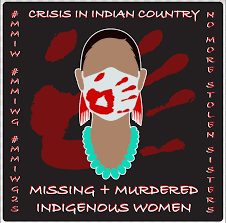Legislation has been introduced by Rep. Adam Schiff (D-Calif.) and Rep. Jared Huffman (D-Calif.) to address the crisis of Missing and Murdered Indigenous People (MMIP) on tribal lands by encouraging record sharing between tribal and state/local law enforcement.

The legislation, entitled the Tribal Community Protection Act, is aimed at addressing the complicated jurisdictional overlaps between federal, state, local, and tribal law enforcement agencies that exacerbate the MMIP crisis.
The Tribal Community Protection Act would create a funding incentive through Byrne Justice Assistance Grants to states and localities that both:
- Submit written notification to tribes about restraining orders (ROs) and temporary restraining orders (TROs) so that they can be enforced by tribal law enforcement on tribal land, and
- Accept and enforce tribal ROs and TROs, in turn.
Of the missing persons included in the National Missing and Unidentified Persons System (NamUs), 3.5% were identified as American Indian and Alaska Native – more than three times their percentage of the U.S. population.
"The violence facing our indigenous communities, particularly women and girls, is a crisis we cannot ignore," said Rep. Schiff. "With the complex nature of government-to-government relationships, sometimes this violence against women and indigenous people can fall through the cracks, or lead to delays and inaction. Our bill aims to bridge this gap by promoting cooperation and information sharing between tribal, state, and local law enforcement agencies. This will not only save lives but also help keep our tribal communities safe and ensure that those who break the law are held to account.”
The Tribal Community Protection Act is supported by the National Congress of American Indians, the National Council of Urban Indian Health, the National Indian Health Board, the National Indigenous Women’s Resource Center, and the Strong Hearted Native Women’s Coalition.
“Tribal communities continue to face the crisis of missing and murdered Indigenous people everyday. Commonsense reforms to support and prevent the disappearance of our people from their communities are vital to help end this crisis. Rep. Schiff’s and Rep. Huffman's bill is one of those commonsense solutions which promotes information sharing between states and localities with Tribes. The National Indian Health Board is proud to support this bill which works to address the ongoing crisis of our missing and murdered Indigenous people,” Chief William Smith ( Eyak Tribe), Chairman of the National Indian Health Board said.
The Tribal Community Protection Act is cosponsored by Representatives Adriano Espaillat (D-N.Y.), Raul Ruiz (D-Calif.), Gwen Moore (D-Wis.), Andrea Salinas (D-Ore.), Julia Brownley (D-Calif.), Joyce Beatty (D-Ohio) and Dina Titus (D-Nev.).
More Stories Like This
Native News Weekly (August 25, 2024): D.C. BriefsUS Presidents in Their Own Words Concerning American Indians
2026 Native American 40 Under 40 Class Announced
Monday Morning: (January 5, 2026): Articles You May Have Missed This Past Weekend
Native News Weekly (January 4, 2026): D.C. Briefs
Help us defend tribal sovereignty.
At Native News Online, our mission is rooted in telling the stories that strengthen sovereignty and uplift Indigenous voices — not just at year’s end, but every single day.
Because of your generosity last year, we were able to keep our reporters on the ground in tribal communities, at national gatherings and in the halls of Congress — covering the issues that matter most to Indian Country: sovereignty, culture, education, health and economic opportunity.
That support sustained us through a tough year in 2025. Now, as we look to the year ahead, we need your help right now to ensure warrior journalism remains strong — reporting that defends tribal sovereignty, amplifies Native truth, and holds power accountable.
 The stakes couldn't be higher. Your support keeps Native voices heard, Native stories told and Native sovereignty defended.
The stakes couldn't be higher. Your support keeps Native voices heard, Native stories told and Native sovereignty defended.
Stand with Warrior Journalism today.
Levi Rickert (Potawatomi), Editor & Publisher


